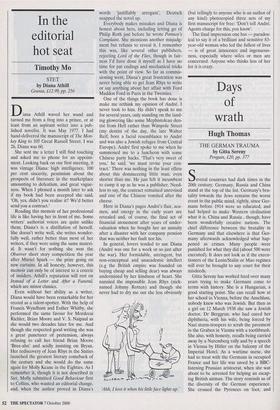In the editorial hot seat
Timothy Mo
STET Diana Athill waved her wand and turned me from a frog into a prince, or at least from an aspirant writer into a pub- lished novelist. It was May 1977. I had hand-delivered the manuscript of The Mon- key King to 105 Great Russell Street. I was 26, Diana was 60.
She sent me a letter I still find touching and asked me to phone for an appoint- ment. Looking back on our first meeting, it was vintage Diana: high intelligence, 100 per cent sincerity, pessimism about the prospects of literature in the marketplace amounting to defeatism, and great vague- ness. When I phoned a month later to ask if my book had been accepted she said, `Oh, yes, didn't you realise it? We'd better send you a contract.'
Reading this memoir of her professional life is like having her in front of me. Some writers' authorial voices are quite unlike them; Diana's is a distillation of herself. She doesn't write well, she writes wonder- fully well, rather better than most of her writers, if they were using the same materi- al. It wasn't for nothing she won the Observer short story competition the year after Muriel Spark — the prize going on new curtains. In all honesty, however, this memoir can only be of interest to a coterie of insiders. Athill's reputation will rest on Instead of a Letter and After a Funeral, which are minor classics.
Even without her ability as a writer, Diana would have been remarkable for her record as a talent-spotter. With the help of Francis Wyndham and Esther Whitby, she performed the same favour for Mordecai Richler, Brian Moore and V. S. Naipaul as she would two decades later for me. And though she respected good writing she was a great puncturer of pretension, always refusing to call her friend Brian Moore `Bree-ahn' and acidly insisting on Bryan. Her rediscovery of Jean Rhys in the Sixties launched the greatest literary comeback of the century and she would do the same again for Molly Keane in the Eighties. As I remember it, though it is not described in Stet, Molly submitted Good Behaviour first to Collins, who wanted an editorial change, and, when the author proved in Diana's words 'justifiably arrogant', Deutsch snapped the novel up.
Everybody makes mistakes and Diana is honest about hers, including letting go of Philip Roth just before he wrote Portnoy's Complaint. She mentions another misjudg- ment but refuses to reveal it. I remember this was, like several other publishers, rejecting Lord of the Flies, though in fair- ness I'd have done it myself as I have no time for pat endings and mechanical tricks with the point of view. So far as commis- sioning went, Diana's great frustration was never being able to get Jean Rhys to write or say anything about her affair with Ford Maddox Ford in Paris in the Twenties.
One of the things the book has done is make me rethink my opinion of Andre. I never took to him. He didn't speak to me for several years, only standing on the land- ing glowering like some Mephistolean den- tist from Hell rather than Wimpole Street (my dentist of the day, the late Walter Reif, bore a facial resemblance to Andre and was also a Jewish refugee from Central Europe). Andre first spoke to me when he summoned me to a luncheon with some Chinese party hacks. 'That's very sweet of you,' he said, 'we must revise your con- tract.' There was nothing in the least effete about this domineering little man, even shorter than me. He just felt it incumbent to camp it up as he was a publisher. Need- less to say, the contract remained unrevised and one of the Chinese vomited after the cheese.
Here in Diana's pages Andre's flair, acu- men, and energy in the early years are revealed and, of course, the final act of financial atonement after years of under- valuation when he bought her an annuity after a disaster with her company pension that was neither her fault nor his.
In general, lovers tended to use Diana (Andre was one for a week or so just after the war). Her formidable, astringent, but non-conceptual and unacademic intellect (e.g the British empire was founded on buying cheap and selling dear) was always undermined by her kindness of heart. She nannied the impossible Jean Rhys (nick- named Johnny Rotten) and though she never had to dry me out she less obviously Ahh, I love it when his little face lights up.' (but tellingly to anyone who is an author of any kind) photocopied three sets of my first manuscript for free: 'Don't tell Andre. Agents charge for this, you know'.
The final impression one has — paradox- ical to say it of a brilliant and sensitive 83- year-old woman who led the fullest of lives — is of great innocence and ingenuous- ness, especially where wiles or men are concerned. Anyone who thinks less of her for it is crazy.


















































































 Previous page
Previous page